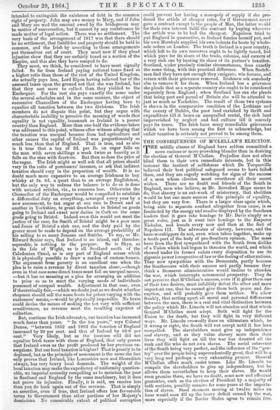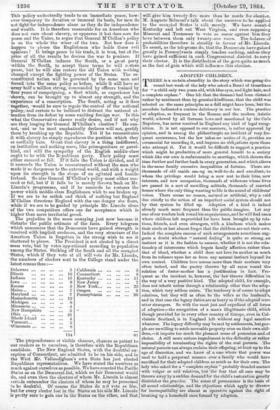THE CONSEQUENCES OF M'CLELLA.N'S ELECTION. T HE middle classes of England
have seldom committed a more curious or more provoking blunder than in desiring the election of General M'Clellan. Prejudice does not often blind them to their own immediate interests, but in this instance. the instinct of selfishness which De Tocqueville believed their best political safeguard seems to have fella them, and they are eagerly watching for signs of the success of a man whose election must overthrow all their secret wishes. There are no doubt real friends of the South in England, men who believe, as Mr. Beresford Hope seems to do, that slavery is an out-work of aristocracy, that abolition would be but one more success of the principle of equality, but they are very few. There is a larger class again which, being able to separate conduct altogether from cause, is so fascinated by the energy and resolve displayed by the Southern leaders that it goes into bondage to Mr. Davis simply as a great ruler, just as it went into bondage to the Emperor Nicholas, and kneels every now and then at the feet of Napoleon III. The advocates of slavery, however, and the hero-worshippers do not, even when taken together' make up a tenth-part of the body of pro-Southern opinion. The mass have from the first sympathized with the South from dislike of a Union which had begun to threaten the world, and which showed under its former rulers every disposition to use its gigantic power irrespective of law or the feeling of other nations. They now sympathize with the Democrats, partly because the Southerners wish their success and partly because they think a Democrat administration would incline to abandon the war, which interrupts commercial prosperity. They do not perceive that ll'Clellan's success, even if it gives them one of their two desires, must infallibly defeat the other and more important one, that he cannot give them both pence' and dis- ruption, and will probably give them neither. We allow frankly, that setting apart all moral and personal differences between the men, there is a real and vital distinction between the policy which Mr. Lincoln will not abandon and that which General M'Clellan must adopt. Both will fight for the Union to the death, but they will fight in very different ways. Mr. Lincoln avowedly fixes an ultimatum which, be it wrong or right, the South will not accept until it has been compelled. The slaveholders must give up independence and slavery, and as they value slavery more than their lives they will fight on till the war has daunted all the rank and file who do not own slaves. The social coherence of the South being very perfect, and the influence of the "gen- try" over the people being unprecedentedly great, that will be a very long and perhaps a very exhausting process. General M'Clellan offers much easier terms. Like Mr. Lincoln he compels the slaveholders to give up independence but he allows them nevertheless to keep their slaves. He would even promise them, we have no doubt, some new and effectual guarantee, such as the election of President by a majority of both sections, possibly connive for some years at the importa- tion of slaves. Steel steamers moving at twelve miles an hour would soon fill up the heavy deficit caused by the war, more especially if the Border States agree to remain free. This policy undoubtedly tends to an immediate peace, how- ever temporary its duration or immoral its basis, for men do not fight for independence alone as they do for independence and wealth. It is therefore reasonable for an American who does not care about slavery, or approves it but does care for peace and the Union, to argue that General M'Clellan's policy is on the whole the wiser of the two. But how does it .happen to please the Englishman who holds those evil opinions ? It brings peace to his trade, it is true, but at the price of all the results he desires the war to produce. If General M'Clellan induces the South, or a great party within the South, to accept these terms he will rtstore peace, but he will also restore the old Union with nothing changed except the fighting power of the States. The re- constituted nation will be governed by the same men and forced into the same policy as before, while it will have an army half a million strong, commanded by officers trained by four years of campaigning, a fleet which, as experience has shown, can be brought up to -almost any strength, and the experience of a conscription. The South, acting as it does together, would be sure to regain the control of the national policy, and certain to be inclined to distract the national at- tention from its defeat by some exciting forcign war. Is this what the Conservative classes really desire, and if not why are they longing for General M'Clellan's eleetion ? Ile can- not, and as he most emphatically declares will not, gratify them by breaking up the Republic. Yet if he reconstitutes .it with slavery he simply reproduces the position which they so cordially hate. Grant that slavery is a thing indifferent, an institution and nothing more, like primogeniture or gavel- ' kind, mid still the sympathy of the English middle-class aught to be with the Republican party. Their policy must • either succeed or fail. If it fails the Union is divided, and if it succeeds the Union is reconstructed without the men who made it so dangerous to the external world, and with a weight upon its strength in the shape of an agitated and hostile Ireland. -So also General ArClellan's policy must either suc- ceed or fail, but if it fails be is merely thrown back on Mr. Lincoln's programme, and if he succeeds he restores the power which middle-class Englishmen wish to see broken up If we are to be selfish and think of nothing but England M'Clellan threatens England with the one danger she fears, while if we are to be guided by principle Mr. Lincoln alone of the two competitors offers one for acceptance which is higher than mere territorial greed.
The prejudice is the more annoying just now because it 'disturbs the public estimate of the facts. Every telegram which announces that the Democrats have gained strength is ' received with implicit credence, and the very structure of the American Union is forgotten in the strong wish to see it • shattered to pieces. The President is not elected by a direct mass vote, but by votes apportioned according to population among the States. Striking off the South and all the occupied States, which if they vote at all will vote for Mr. Lincoln, the numbers of electors sent to the College stand under the latest census thus :- Delaware ... ... 3
'Illinois ... 16 Indiana ... ... 13 Iowa 8 Kansas 3
7 Maryland ... 7 Massachusetts ... 12 Michigan ... 8 Minnesota ... 4 New Hampshire ... 5
21 Rhode Island ... 4 Vermont... ... 5 \Wisconsin 8
124 California ... • •• 5 Connecticut • .• 6 Kentucky ... . • 11 New Jersey .•. 7 New York... • • • 33
Oregon ...
..• 3 Pennsylvania ••• 26
91
The preponderance of visible chances, chances as patent to our readers as to ourselves, is therefore with the Republican candidate. The New England States, with the doubtful ex- ception of Connecticut, are admitted to be on his side, and in the West Mr. Yallandigham's own State has just elected Bepablican representatives. We have stated the numbers as much against ourselves as possible. We have counted the Pacific States as on the Democrat list, which no fair Democrat would do, and even then the electors of whom Mr. Lincoln is almost certain outnumber the electors of whom he may be presumed to be doubtful. Of course the States do nat vote en bloc, but for every elector lost in the States on his side Mr. Lincoln is pretty sure to gain one in the States on the other, and that will give him twenty-five more than he needs for election. M. Auguste Belmont's talk about the coercion- to be applied to the occupied States is talk merely. We have counted Kentucky and left out West Virginia, and even supposing 'Missouri and Tennessee to vote en masse against him they heve between them only twenty-one votes. The balance:of probabilities therefore is steadily in favour of Mr. Lincoln. To assert, as the telegrams do, that the Democrats have gained greatly in Pennsylvania simply teaches nothing, unless they have gained, sufficient in each Congressional district to carry their elector. It is the distribution of the gain as-much as the fact of gain which will influence this election.



































 Previous page
Previous page